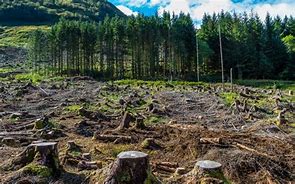Islamabad, Dec 30: Deforestation in Pakistan is rapidly accelerating, and its effects are being felt across the country. The loss of forests is not only threatening biodiversity but also destabilizing the country’s economy.
The Current State of Deforestation in Pakistan
Pakistan’s forest cover has been steadily decreasing over the years. According to the Food and Agriculture Organization (FAO), the country has one of the highest rates of deforestation in the world. As of recent estimates, Pakistan’s forest cover is less than 2.5% of its total land area, a stark contrast to the global average of about 31%.
Key Drivers of Deforestation
- Illegal Logging: The demand for timber for construction, furniture, and firewood is a major cause of illegal logging, especially in remote areas.
- Agricultural Expansion: Farmers clear forests to create space for crops and livestock, a practice that continues to expand due to the growing population.
- Urbanization: The spread of cities and infrastructure development often leads to the destruction of surrounding forests.
- Climate Change: Changing weather patterns have made forests more vulnerable to pests, diseases, and fires.
Environmental Impacts of Deforestation
Deforestation has far-reaching consequences on Pakistan’s natural environment. These effects are becoming increasingly apparent as ecosystems struggle to maintain balance.
Loss of Biodiversity
- Forests in Pakistan, particularly in the northern regions, are home to diverse species of plants, animals, and insects. Deforestation disrupts these habitats, threatening endangered species such as the Himalayan brown bear and the snow leopard.
- The loss of biodiversity not only harms wildlife but also affects the health of ecosystems that humans depend on.
Soil Erosion and Water Scarcity
- Without trees to stabilize the soil, the land becomes more susceptible to erosion. In the mountainous regions of northern Pakistan, this leads to landslides that endanger communities and infrastructure.
- Deforestation also contributes to water scarcity. Trees play a vital role in maintaining the water cycle by absorbing and releasing water. With fewer trees, the availability of water in rivers and streams decreases.
Increased Carbon Emissions
- Forests act as carbon sinks, absorbing significant amounts of carbon dioxide (CO2). The reduction in forest cover exacerbates climate change, as more CO2 is released into the atmosphere.
- Pakistan is already facing the consequences of climate change, including erratic weather patterns and rising temperatures.
Economic Implications
Deforestation also has severe economic consequences for Pakistan. The loss of forests directly affects various sectors that contribute significantly to the country’s economy.
Agriculture and Livelihoods
- The agricultural sector is one of the most vulnerable to deforestation. Soil degradation, reduced water supply, and climate change all negatively impact crop yields.
- Many rural communities rely on forests for firewood, medicinal plants, and income from forest-based industries. The destruction of forests leaves these communities with fewer resources, pushing them into poverty.
Tourism Industry
- Forests, particularly in northern Pakistan, are major attractions for tourists. The natural beauty of these forests supports eco-tourism, which is a growing sector in the country. Deforestation undermines this potential by destroying picturesque landscapes and wildlife habitats.
Long-Term Economic Growth
- The depletion of forests compromises the long-term economic stability of Pakistan. Natural resources, including timber and medicinal plants, are critical to many industries. The ongoing loss of forests diminishes the availability of these resources, impacting both local and national economies.
Solutions and Way Forward
Reforestation and Afforestation
- Pakistan has launched several initiatives like the 10 Billion Tree Tsunami project, aiming to restore the country’s lost forests. These efforts need to be scaled up and maintained to effectively counteract the impact of deforestation.
Strengthening Policies and Enforcement
- Stricter regulations on illegal logging and land use are essential. The government must invest in monitoring and enforcement mechanisms to prevent further forest loss.
Sustainable Agriculture
- Encouraging sustainable agricultural practices, such as agroforestry, can help reduce the need for deforestation. Agroforestry integrates trees into farming systems, providing both environmental and economic benefits.









